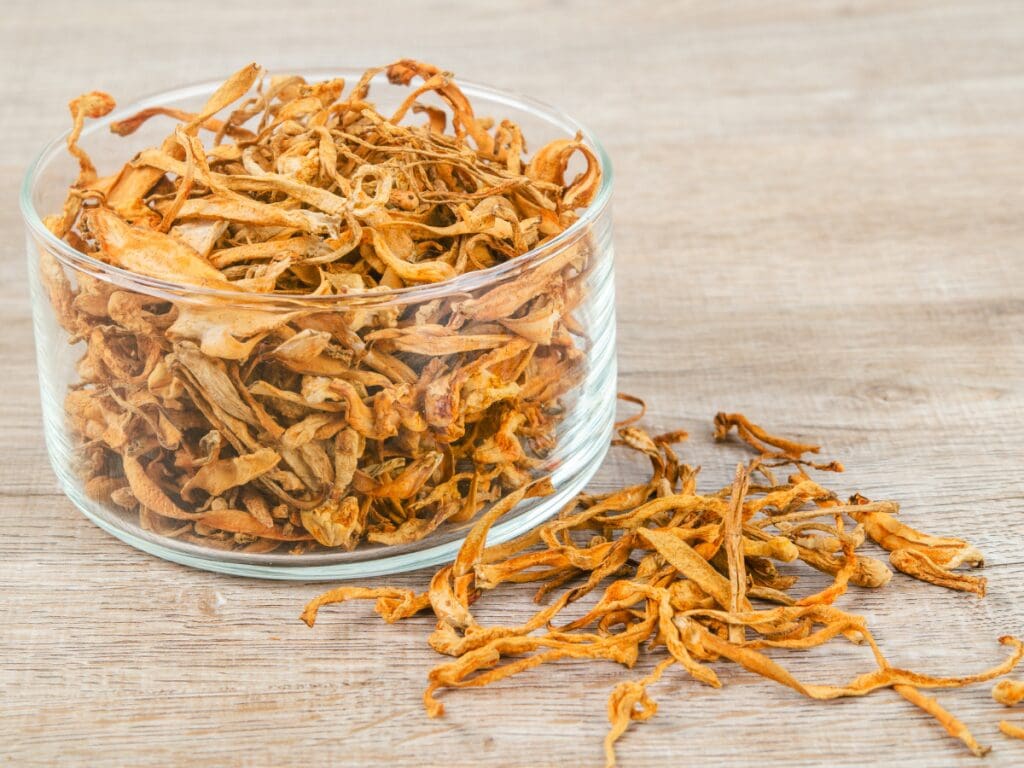Key Takeaways:
- Diverse Benefits: Mushrooms like Lion’s Mane and Reishi offer significant mental health benefits, including enhanced cognitive functions and stress reduction, with minimal side effects.
- Cost-Effective Alternative: Mushrooms provide a more accessible and cost-effective alternative to traditional anxiety medications, with options for home cultivation or over-the-counter supplements.
- Holistic Health Approach: Integrating mushrooms into a wellness routine, complemented by practices like meditation and regular exercise, can maximize their anxiety-reducing effects for overall better mental health.
HappyHemp, with its prestigious reputation in the realm of natural health products, proudly stands at the intersection of holistic well-being and botanical expertise. We are committed to exploring and promoting the most effective natural options for mental wellness, recognizing the significant role of mushrooms as potential alleviators of stress and anxiety in our increasingly hectic world.
Renowned in the natural health products industry, Happy Hemp excels at combining holistic well-being with botanical expertise. We are dedicated to discovering and advocating for the best natural solutions for mental wellness, particularly highlighting the role of mushrooms in reducing stress and anxiety.
This article investigates how certain mushrooms can help reduce anxiety, identifies which types are good for mental wellness, and compares them to traditional anxiety treatments. We will also offer tips on how to integrate these mushrooms into your wellness routine and highlight important safety precautions. By exploring the connection between mushrooms and mental health, you may discover a natural way to manage anxiety.
The Role Of Mushrooms In Mental Health
From the neuroenhancing and neuroprotective properties of psilocybin and compounds in Lion’s Mane to the stress-reducing effects of Reishi and Chaga, mushrooms offer a compelling natural alternative to conventional mental health therapies. Although they are not substitutes for professional medical treatment, incorporating mushrooms could enhance traditional approaches, providing a holistic avenue for those seeking to manage their mental health with minimal side effects. As research continues to grow, the integration of these fungi into mental wellness regimens could represent a transformative shift towards more integrative and natural mental health solutions.
Discover the ease of incorporating these natural benefits into your regimen with Happy Hemp’s Mushroom Gummies. Our gummies offer the stress-reducing effects of mushrooms, providing a simple, effective addition to your wellness routine.
Exploring The Scientific Evidence
Recent research has highlighted the potential of certain mushrooms as neuroenhancers and protectants. Compounds like psilocybin, found in psychedelic mushrooms, and hericenones and erinacines from Lion’s Mane, are studied for their ability to promote neurogenesis and offer neuroprotective benefits. These findings suggest that mushrooms might not only alleviate symptoms of anxiety but could also contribute to overall brain health and resilience.
Psychological Effects Of Mushroom Consumption
Mushrooms such as Reishi and Chaga have long been valued in traditional medicine for their calming effects. These mushrooms have been used for centuries to alleviate stress. Contemporary research backs these traditional uses, indicating that regular consumption can help manage the body’s stress response, potentially lessening the frequency and intensity of anxiety episodes.
The Synergistic Effects of Mushrooms and Holistic Health Practices
Combining the therapeutic benefits of mushrooms with holistic health practices offers a comprehensive approach to managing anxiety and enhancing overall mental wellness. Mushrooms like Lion’s Mane and Reishi naturally support the nervous system and improve mental clarity, while holistic practices such as yoga and meditation can reduce stress and improve physical and mental balance. Here’s how these elements can work together:
- Yoga and Meditation: Incorporating mushrooms into a routine that includes yoga and meditation can significantly amplify the calming effects. As mushrooms help to stabilize the body’s chemical balance, practices like yoga improve physical health and mindfulness, which together enhance the body’s natural resilience to stress.
- Balanced Diet: A diet that includes anxiety-reducing mushrooms and is rich in vitamins and minerals supports brain health and overall well-being. When combined with mushrooms, a balanced diet can improve gut health, which is closely linked to mental health due to the gut-brain axis.
- Regular Exercise: Physical activity is well-known for its ability to alleviate stress and improve mood. By integrating mushrooms with a consistent exercise regimen, individuals can experience enhanced energy levels and a natural boost in mood, thanks to the improved endorphin release and the supportive properties of mushrooms.
- Quality Sleep: Mushrooms like Reishi have properties that aid sleep, an essential component of mental health. Pairing mushroom consumption with good sleep hygiene practices can help consolidate the therapeutic effects, leading to better stress management and mental clarity.
Mushrooms Beneficial For Anxiety
Lion’s Mane Mushroom
Lion’s Mane mushroom has been shown to support brain health by stimulating the synthesis of nerve growth factors, which can help improve mental functioning and emotional well-being. Studies suggest that regular intake of Lion’s Mane can alleviate mild symptoms of anxiety and depression, thereby enhancing one’s mood and cognitive abilities. This makes it an excellent choice for those seeking natural remedies to boost mental clarity and support overall emotional health.
Reishi Mushroom
Reishi mushroom holds a place of honor in traditional Chinese medicine due to its extensive health benefits, particularly in immune support and stress reduction. Known for its calming properties, Reishi acts as an adaptogen, helping to stabilize the body’s hormonal responses to stress. Consuming Reishi can aid in lowering anxiety levels, promoting a state of relaxation without inducing drowsiness. This makes it ideal for individuals looking to manage daily stress while maintaining alertness and productivity.
Cordyceps Mushroom
Cordyceps mushrooms are famed for their energy-boosting properties, often utilized by athletes to enhance performance and endurance. Beyond physical energy, Cordyceps also have significant benefits for managing stress and improving mental energy. By helping to regulate the body’s stress response and improving mitochondrial energy production, Cordyceps can reduce fatigue and enhance mood stability. This makes them a valuable supplement for those seeking to balance their energy levels while managing anxiety symptoms.

How Mushrooms Impact Anxiety Levels
Neurological Mechanisms Behind Mushrooms’ Effects
Mushrooms contain bioactive compounds that can influence brain chemistry. For example, compounds like psilocybin interact directly with serotonin receptors in the brain, potentially reducing anxiety and depression symptoms. This interaction mimics the effects of serotonin-enhancing antidepressants but often with fewer side effects, providing a natural means to modulate mood and cognitive functions.
The Role Of Bioactive Compounds In Mushrooms
The bioactive compounds in mushrooms, such as beta-glucans, hericenones, and erinacines, are thought to boost immune function and reduce inflammation. By potentially lowering inflammation, these compounds help mitigate one of the root causes of chronic stress and anxiety, paving the way for a more balanced mental state.
Long-Term Vs. Short-Term Effects On Anxiety
Incorporating mushrooms into one’s diet or wellness routine can offer different benefits over varying timelines. Short-term effects may include immediate feelings of relaxation and a temporary boost in mood, due to the calming properties of compounds like those found in Reishi mushrooms. Over the long term, the neurogenerative effects of Lion’s Mane, for example, may contribute to sustained improvements in brain health and resilience against stress. Regular consumption is key to realizing these benefits, as the cumulative effects of mushrooms’ bioactive components can significantly enhance mental health over time.
Comparing Mushrooms And Traditional Anxiety Treatments
Efficacy Of Mushrooms Compared To Medications
Mushrooms offer a natural alternative to traditional anxiety medications with compelling evidence pointing to their efficacy in managing symptoms. Unlike many pharmaceuticals that may come with a risk of dependency or severe side effects, mushrooms provide a gentler approach. Studies have shown that certain mushrooms, like Lion’s Mane and Reishi, can help reduce anxiety with minimal side effects, making them an appealing option for those cautious of conventional drug therapies.
Side Effects: Mushrooms Vs. Pharmaceuticals
One of the most significant advantages of using mushrooms for anxiety is their side effect profile. While traditional anxiety medications can cause a range of side effects from drowsiness to gastrointestinal distress, mushrooms are generally well-tolerated. The most common side effects associated with mushrooms are mild digestive upset, which is often transient and can be mitigated by adjusting the dosage or method of consumption.
Accessibility And Cost Comparison
Mushrooms are also more accessible and can be more cost-effective compared to many anxiety medications. They can be grown at home or purchased as supplements at a fraction of the cost of prescription drugs. This ease of access, coupled with the low cost, makes mushrooms a viable and sustainable option for long-term management of anxiety. Furthermore, mushrooms do not require a prescription, allowing individuals to take a more active role in their mental health care.
Integrating Mushrooms Into Your Wellness Routine
Dietary Incorporation: Tips And Tricks
Integrating mushrooms into your diet is a practical and effective way to utilize their mental health benefits. Here are some tips and tricks for incorporating these beneficial fungi into your meals:
- Start with Soups and Broths: Mushrooms, especially varieties like Reishi that have a bitter taste, blend well into soups and broths. These dishes mask the bitterness while extracting the soothing properties of the mushrooms. A simple mushroom broth can be made by simmering dried mushrooms with herbs and vegetables, providing a calming, nutrient-rich base for your recipes.
- Tea and Coffee Blends: For a comforting and therapeutic start to your day, add powdered Lion’s Mane or Cordyceps to your morning tea or coffee. These mushrooms don’t significantly alter the flavor but add a mental clarity-boosting effect to your regular caffeine routine.
- Smoothies and Juices: Incorporate mushroom powders into your smoothies for a nutrient-packed beverage. Blending a teaspoon of mushroom powder like Chaga or Lion’s Mane with fruits, vegetables, and a protein source makes for a balanced, anxiety-reducing snack.
- Use in Traditional Cooking: Replace or complement the meat in your dishes with culinary mushrooms such as Shiitake or Portobello, which are tasty and also carry beneficial nutrients. These mushrooms can be grilled, baked, or sautéed and added to almost any dish, enhancing flavor and nutritional value.
Each of these methods provides a seamless way to add mushrooms to your diet, making it easier to enjoy their anxiety-reducing benefits daily.
What To Look For In Mushroom Supplements
When opting for mushroom supplements, look for ones that specify “full spectrum” or “whole mushroom” extracts, which include both the mycelium and the fruiting body of the mushroom. These forms ensure a higher concentration of the bioactive compounds responsible for reducing anxiety. Additionally, verifying that the product is free from fillers and is organically certified can help avoid contaminants that detract from the benefits.
Enhancing Mushroom Benefits With Lifestyle Changes
To maximize the anxiety-reducing effects of mushrooms, consider pairing them with other stress-reducing practices. Activities such as yoga, meditation, and regular exercise not only complement the effects of mushrooms but also promote overall mental and physical well-being. Ensuring a well-rounded approach that includes sufficient sleep and a balanced diet can amplify the benefits of these mushrooms.
Precautions And Considerations When Using Mushrooms For Anxiety
Identifying Quality Mushroom Sources
Look for reputable suppliers that provide transparent information about their cultivation and harvesting practices. Organic certification is a key indicator of quality, as it suggests the mushrooms are free from harmful pesticides and contaminants. Additionally, consider the origin of the mushrooms, as those grown in controlled environments are less likely to be contaminated with heavy metals and other pollutants.
Potential Drug Interactions And Side Effects
While mushrooms offer a natural way to manage anxiety, they are not free from potential interactions and side effects. Certain mushrooms can interact with prescription medications, particularly those that affect the immune system or have sedative properties. It is essential to consult with a healthcare provider before starting any new supplement regimen, especially if you are currently taking other medications. Side effects are typically mild but can include digestive discomfort and changes in alertness, depending on the mushroom type used.
When To Consult A Healthcare Provider
Finally, while mushrooms can be a valuable part of an anxiety management strategy, they are not a substitute for professional medical advice. If symptoms of anxiety persist or worsen, it is important to consult with a healthcare provider. They can provide a comprehensive evaluation and recommend a treatment plan that may include mushrooms along with other therapies. It is also vital to seek medical advice to ensure that mushroom use is appropriate for your specific health circumstances and to monitor any potential adverse effects.

Final Thoughts
Mushrooms have the potential to reduce anxiety and improve overall mental health, and there is a growing body of scientific data to back it up. These natural fungi offer a viable alternative to traditional anxiety treatments with fewer side effects and at a lower cost. By integrating mushrooms into your wellness routine, whether through dietary inclusion or supplements, you can take a proactive step towards managing anxiety in a holistic and natural manner.
Read also:
- Unlocking the Power of Mushroom Supplements: Immune Support and Cognitive Enhancement
- What Are Functional Mushrooms and Adaptogens – Everything You Need to Know
- Exploring Amanita Muscaria Effects: What happens if I eat Amanita Muscaria?
Frequently Asked Questions About Mushrooms For Anxiety
Can magic mushrooms be used to treat anxiety?
Yes, psilocybin, found in magic mushrooms, has shown promise in clinical studies for reducing anxiety, especially in life-threatening conditions.
What are the recommended dosages for using mushrooms for anxiety?
Dosages can vary widely depending on the type of mushroom and the form it is taken in; it’s crucial to follow specific supplement instructions or consult healthcare professionals.
How quickly do mushrooms work for anxiety?
Effects can vary; some people might feel benefits shortly after consumption, while for others, it might take several weeks of regular use to notice changes.
Can I use cooking mushrooms to reduce anxiety?
While culinary mushrooms like shiitake and portobello have health benefits due to their nutritional content, they do not have the potent bioactive compounds specific to medicinal mushrooms like Reishi or Lion’s Mane that are associated with reducing anxiety.
Can mushrooms replace anxiety medication?
While promising, mushrooms should not replace conventional anxiety treatment prescribed by a healthcare provider without professional guidance.
Are mushroom supplements safe?
Generally, mushroom supplements are considered safe for most people, but it’s advisable to consult with a healthcare provider, especially if you have underlying health conditions or are taking other medications.
Can mushrooms be used alongside other treatments for anxiety?
Yes, mushrooms can be used as a complementary treatment, but you should consult healthcare professionals to ensure safety, especially regarding interactions with other treatments.
What form of mushrooms is most effective for anxiety?
Extracts and powders from medicinal mushrooms are often preferred for their potency and ease of use compared to whole mushroom forms.
Are there any people who should avoid taking mushroom supplements?
People with mushroom allergies, those on medication metabolizing liver enzymes, and pregnant or nursing women should avoid or be cautious.
How can I start using mushrooms for anxiety?
Begin with a low dose to assess tolerance and consult with a healthcare provider to ensure it fits your health profile and needs.
Sources:
- Mizuno, T., Wang, G., Zhang, J., Kawagishi, H., Nishitoba, T., & Li, J. (1995). Reishi, Ganoderma lucidum and Ganoderma tsugae: bioactive substances and medicinal effects. Food Reviews International, 11(1), 151-166.
- Gao, Y., & Zhou, S. (2002). The immunomodulating effects of Ganoderma lucidum (Curt.: Fr.) P. Karst.(Ling Zhi, reishi mushroom)(Aphyllophoromycetideae). International Journal of Medicinal Mushrooms, 4(1).
- Ghosh, S., Nandi, S., Banerjee, A., Sarkar, S., Chakraborty, N., & Acharya, K. (2021). Prospecting medicinal properties of Lion’s mane mushroom. Journal of Food Biochemistry, 45(8), e13833.
- Das, S. K., Masuda, M., Sakurai, A., & Sakakibara, M. (2010). Medicinal uses of the mushroom Cordyceps militaris: current state and prospects. Fitoterapia, 81(8), 961-968.
- Wong, K. H., Naidu, M., David, R. P., Bakar, R., & Sabaratnam, V. (2012). Neuroregenerative potential of lion’s mane mushroom, Hericium erinaceus (Bull.: Fr.) Pers.(higher Basidiomycetes), in the treatment of peripheral nerve injury. International journal of medicinal mushrooms, 14(5).







